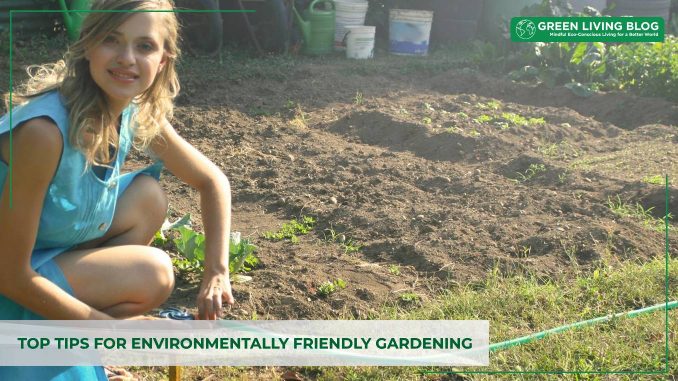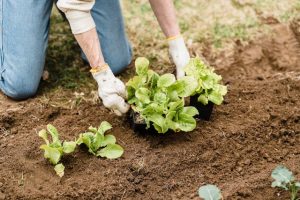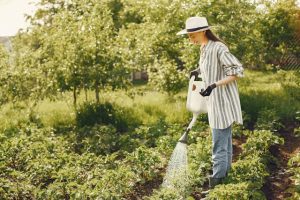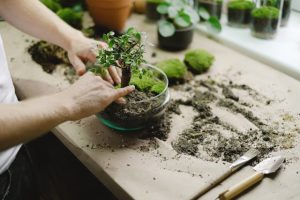
Creating an eco-friendly garden is not only beneficial for the environment but also enhances the beauty and health of your outdoor space.
By adopting sustainable practices, you can reduce waste, conserve resources, and support local wildlife.
Here are nine top tips to help you cultivate an environmentally friendlier garden.
1. Use Native Plants

Native plants are adapted to the local climate and soil conditions, making them easier to grow and maintain. They require less water, fertiliser and pesticides, reducing your garden’s overall environmental impact. Additionally, native plants provide essential habitat and food for local wildlife, promoting biodiversity.
2. Compost Organic Waste
Composting is an excellent way to recycle kitchen scraps and garden waste into nutrient-rich soil. Set up a compost bin or heap in a convenient location and regularly add organic materials such as fruit and vegetable peelings, coffee grounds, grass clippings and leaves. Turn the compost regularly to speed up decomposition and ensure even breakdown of materials.
3. Collect Rainwater

Using rainwater for your garden reduces the demand for municipal water supplies and helps you save on water bills. Install a rainwater collection system, such as a water butt or rain barrel, to capture runoff from your roof. Use the collected rainwater to irrigate your plants, which is especially beneficial during dry periods, of course. In addition, rainwater that is collected won’t run off straight into waterways which can help to prevent local areas from excessive exposure to rain and flooding.
4. Choose Sustainable Garden Accessories
Opt for sustainable and eco-friendly garden products whenever possible. This includes organic fertilisers, biodegradable pots and tools made from recycled or sustainably sourced materials. Conversely, you should avoid chemical pesticides and herbicides, which can harm beneficial insects and contaminate soil and water sources, when tending to your eco-friendly garden. In addition to using sustainable accessories in your garden, it’s important to consider the environment inside your home too. A commercial dehumidifier with a high moisture removal rate can help reduce excess moisture in indoor spaces, protecting your plants and gardening tools from mold and mildew.
5. Mulch Your Garden Beds

Mulching helps retain soil moisture, suppress weeds and improve soil health. Use organic mulches, such as wood chips, straw or compost, which break down over time and enrich the soil. Apply a layer of mulch around your plants and garden beds to conserve water and reduce the need for chemical weed control.
6. Create a Wildlife Habitat
Encourage local wildlife to visit your garden by providing food, water, and shelter. Plant a variety of flowers, shrubs and trees that offer nectar, seeds and berries for birds, bees, and other pollinators. Install bird feeders, birdbaths, and insect hotels to create a welcoming environment for wildlife. Leaving a small pile of logs or rocks can also provide a much-needed habitat for beneficial insects and small animals that may help to prevent the extinction of native species.
7. Practice Companion Planting

Companion planting involves growing certain plants together to enhance growth, deter pests and improve soil health. This age-old gardening practice relies on the natural relationships between plants to create a balanced and productive garden. For example, planting marigolds with tomatoes can help repel harmful insects such as nematodes and whiteflies, thanks to the marigolds’ natural pest-deterring properties. Similarly, beans can fix nitrogen in the soil, enriching it and benefiting nitrogen-hungry plants like corn and squash. Other classic companion pairings include basil with tomatoes to enhance flavour and repel flies and carrots with onions to deter carrot flies and onion flies.
8. Opt for Eco-Friendly Garden Seating
Choosing eco-friendly garden furniture is another great way to enhance the sustainability of your outdoor space. Look for furniture made from sustainably sourced materials, such as reclaimed wood, recycled plastic, or bamboo. These materials are not only environmentally friendly but also durable and stylish. When shopping for garden furniture, consider brands that prioritise sustainability and ethical production practices.
Additionally, opt for pieces that are designed to last, reducing the need for frequent replacements. By investing in high-quality, eco-friendly furniture, you can create a comfortable and attractive garden setting that aligns with your commitment to environmental responsibility.
9. Grow Your Own Food
Growing your own fruit, vegetables and herbs is a rewarding way to reduce your carbon footprint and enjoy fresh organic produce. Start with easy-to-grow crops like tomatoes, lettuce and herbs and expand your garden as you gain confidence. Not only does homegrown produce taste better, but it also eliminates the need for plastic packaging and reduces transportation emissions, both of which have a significant carbon footprint.
In the end, transforming your garden into an eco-friendly haven is a fulfilling way to contribute to environmental sustainability. By incorporating native plants, composting organic waste, collecting rainwater, and adopting other sustainable practices, you can create a garden that is both beautiful and beneficial to the planet. Embrace these top tips for an eco-friendly outdoor space and enjoy the rewards of a greener, healthier outdoor space.
![]()
Author Profile
- Online Media & PR Strategist
- Blogger and Educator by Passion | Senior Online Media & PR Strategist at ClickDo Ltd. | Fascinated to Write Lifestyle Blogs in News & Education I have completed a journalism summer course at the London School of Journalism and manage various blogs.
Latest entries
 Green Expert GuidesMarch 28, 2025Lisbon Living: Where Sustainable Charm Meets Urban Energy
Green Expert GuidesMarch 28, 2025Lisbon Living: Where Sustainable Charm Meets Urban Energy EnvironmentJanuary 21, 2025Buying Eco-Friendly Homes: 6 Eco Questions to Ask Your Real Estate Agent
EnvironmentJanuary 21, 2025Buying Eco-Friendly Homes: 6 Eco Questions to Ask Your Real Estate Agent BusinessJanuary 16, 202510 Benefits of used Office Furniture when Refurbishing an Office
BusinessJanuary 16, 202510 Benefits of used Office Furniture when Refurbishing an Office Best practicesJanuary 6, 2025Eco-Friendly Event Planning: Mastering Sustainable Waste Management for Holiday Celebrations
Best practicesJanuary 6, 2025Eco-Friendly Event Planning: Mastering Sustainable Waste Management for Holiday Celebrations






Leave a Reply
You must be logged in to post a comment.